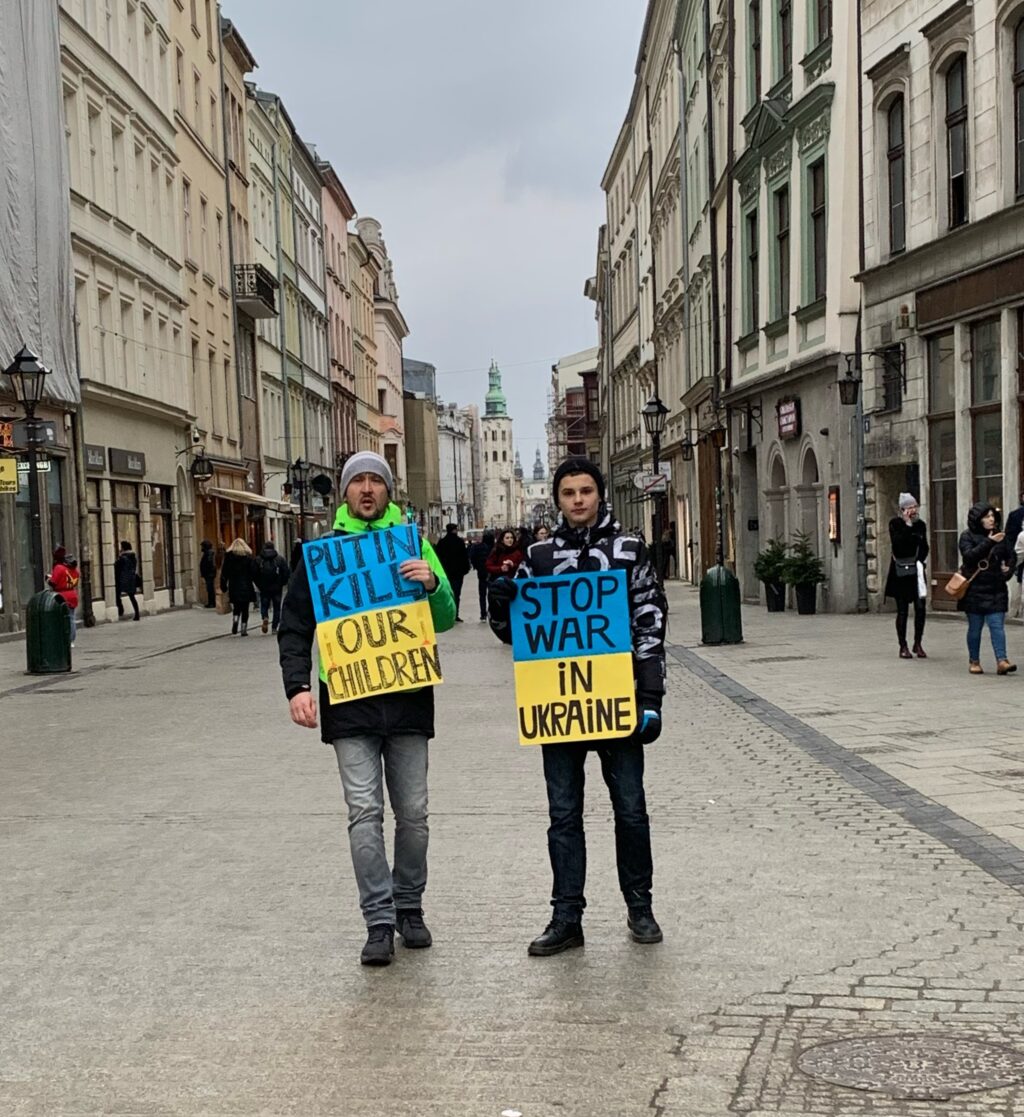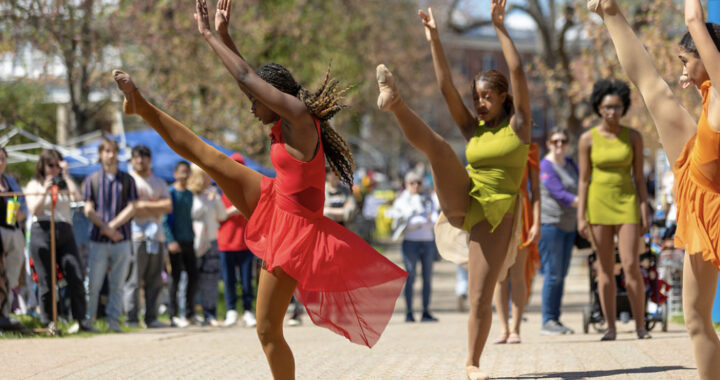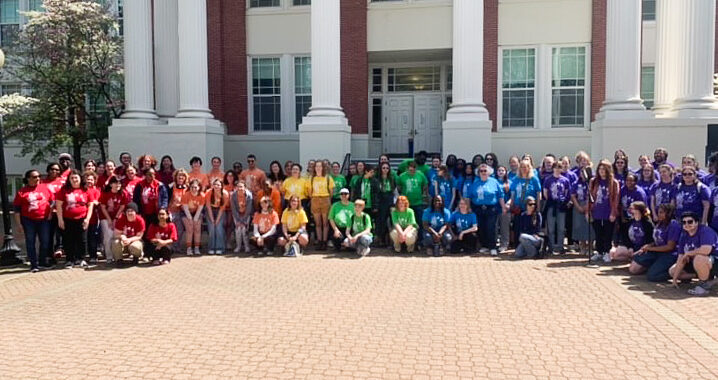Faculty-led group travels to Poland during spring break
4 min read
Two men standing in the street in Poland protesting the war against Ukraine. | Photo Courtesy of Megan Rinald
by EMILY HEMPHILL
Staff Writer
Over spring break, a group of students and faculty traveled abroad to Poland for a Holocaust Memory and Polish Art and Culture program. Due to the ongoing conflict in Ukraine, over half of the 21 students who originally planned to attend stayed home and completed an online version of the program. While the destination of the trip was Poland, the war in Ukraine made a substantial impact on those who attended in person.
The group was in Poland from Feb. 26 to March 5, which was at the onset of the Russian invasion, so the impending influx of refugees had not reached the country yet. However, support for Ukraine and preparations for its fleeing citizens was already evident.
Despite controversy over whether to move forward with the trip and last-minute changes, the faculty-led group was able to see firsthand some of the consequences that war has on citizens around the world, which opened the door to conversations about the refugee crisis and ethnicity.
“We fully counted on encountering refugees,” said associate professor of German and modern languages department chair Marcel Rotter, one of the faculty members on the trip. “But that turned out to be a good thing for students to actually see how something like that works and what effects war has on people. It helps put the war in a different light, which was very impactful for them.”
Senior international affairs and German double major Shannon Harmon noted seeing the Ukrainian flag everywhere: in the windows of businesses, on public transportation and even a massive flag draped over buildings in the market square in the city of Krakow.
“We walked by a refugee center at a Jewish community center in Krakow that had a big banner saying ‘Welcome Ukrainians’ in Ukrainian,” she said.
According to Harmon, blue and yellow lights lit up the night. Posters and drawings covered various structures with statements like “Glory to Ukraine.” A Jewish community center in Krakow had been transformed into a shelter ready to welcome refugees. Evacuating Ukrainians were being housed at the group’s hotel. Harmon and a friend passed a peaceful protest of the war on their way out to dinner.
One student on the trip, Katriel Lee, a sophomore political science and pre-law philosophy double major, was seated next to a young woman leaving Ukraine on a flight from Munich to Krakow.
The two were able to communicate some, and Lee learned that the woman’s husband, also from Ukraine, was currently working in Seattle and she was on her way to the U.S. embassy in Poland to obtain a visa.
Lee admitted that while she is thankful that the U.S. and so many other countries have readily opened their borders to Ukrainian refugees, it is also heartbreaking as the refugee crisis is much greater than simply Ukraine.
“The fact that we are so quick to accept people that have light skin and blue eyes into our country when they have a crisis, but we see so many crises all the time, I think it points out a very glaring problem we have with race,” Lee said.
Poland has currently taken in over a million Ukrainians in the past few weeks, but this contradicts their strong anti-refugee sentiments in recent years, especially with those from African and Middle Eastern nations, according to an article in the New York Times. However, this hypocritical treatment of displaced persons is not a uniquely Polish issue, but worldwide, according to the BBC.
“In this country there are plenty of refugees too,” said Rotter. “But they are hidden, they are not really visible to our students.”
While being close to Ukraine altered certain aspects of the trip, no changes had to be made to the trip itinerary. The group spent time in both Krakow and the capital city, Warsaw, and visited famous sites such as Wawel Royal Castle, Auschwitz, the Jewish quarters in Warsaw and many more places.
Ultimately, nine of the original 21 students attended the trip in person.
“I think a lot of students were very nervous,” said Sarah Moran, the study abroad coordinator for faculty-led programs. “It looks very scary when you look on a map and see here’s Russia, there’s Poland and Ukraine is in the middle. Unpredictability is a very difficult thing to wrap your head around.”
Some students decided not to attend in the days leading up to the trip and even on the morning of departure.
“It was really difficult because I really wanted to go, but I didn’t think it was the right decision at the time,” said Ella Krygiel, a senior English major who decided not to attend the Poland trip. “I was really disappointed, but with everything going on and the uncertainty at the time it didn’t feel right.”
This year was the first time the Holocaust Memory program has gone to Poland. The course cycles through different countries to visit each year, such as Germany, Austria and Hungary. The Polish Art and Culture class was also connected with the Poland trip, so students could receive credit from either class.
The Center of International Education and the two professors associated with the trip, Rotter and associate professor of German Jennifer Hansen-Glucklich, tried to accommodate all of the students. Hansen-Glucklich stayed back to set up a virtual class for those who decided not to go so they could still receive the academic credit. Most of the museums and other sites that the students would have toured had virtual experiences.
Because of the late cancellations, it is unlikely that these individuals will be able to receive full refunds on all of the expenses such as airfare, accommodations, education abroad, faculty director cost, food and tours, according to Moran. However, she is hoping to get around $800 back per person from refunding flights, insurance premiums and the education abroad fee.











